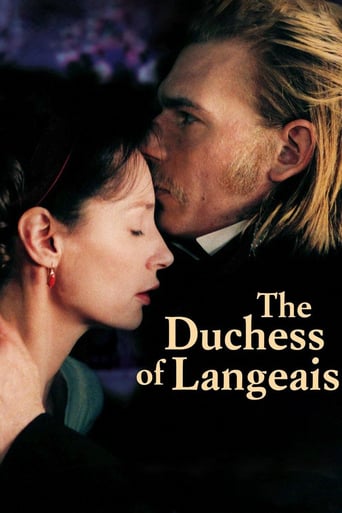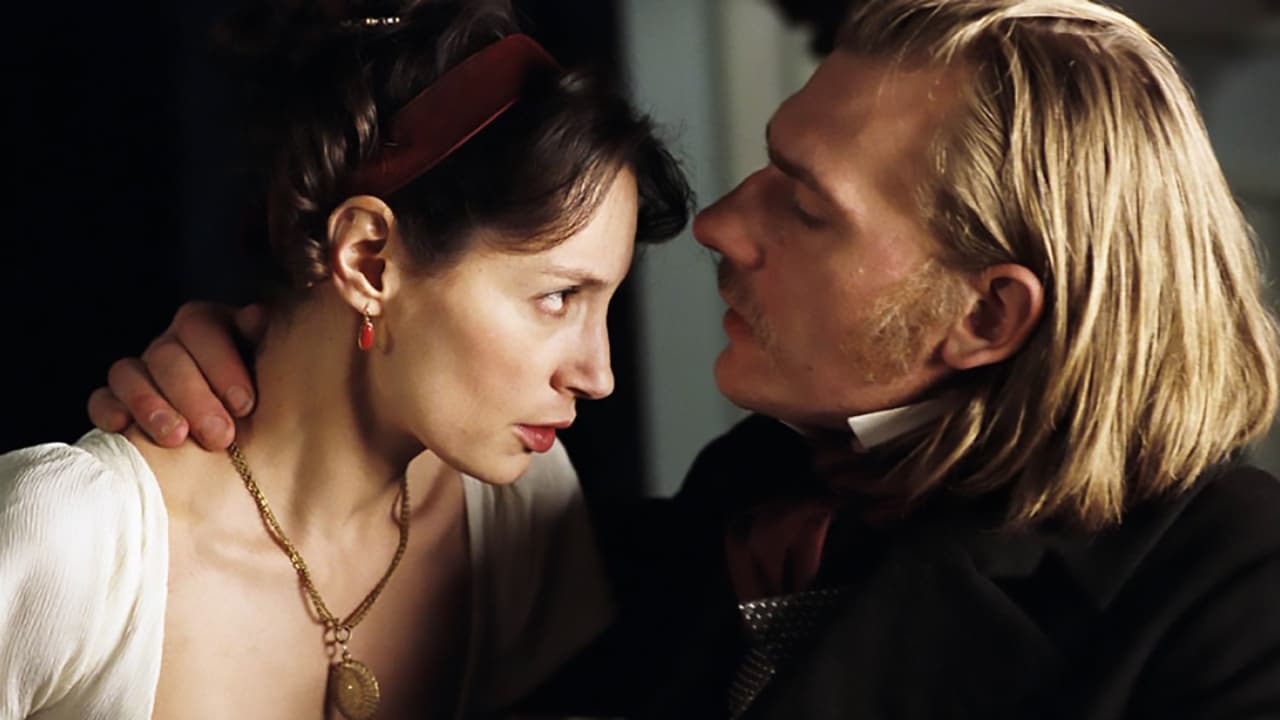Seamus2829
Okay, I'll admit it. I've only seen a couple of Jacques Rivette's films apart from this one (Celine & Julie Go Boating & Le Belle Noisettes). I had heard prior to seeing those that Rivette was always one to make it difficult for audiences (timing being one:a standard Rivette film clocks in no less than two and a half hours). 'Ne Touchez Pas La Hache' is a beautifully filmed exercise cinematic narcolepsy. The characters seem to sleepwalk their way throughout this film. A few of the other cinephiles in attendance seemed to get their jollies from this film. To each their own, I say. I guess I should see some more of Rivette's work before I toss in the towel on him (I still prefer Trufaut,or even Goddard,among the French "new wave" directors).
jdickson05
Jacques Rivette knows how make his feelings bare, then have them mysteriously vanish into dark corners. The same could be said about his characters. The disappearing act takes place when another actor takes over, but the actor who has gone, stays with you; doesn't move but lies in wait.A modern masterpiece from Rivette which gave me the excitement and awe I experienced when I first encountered Truffaut, Chaplin, Vigo, Renoir, and Becker. For others, it may be Rohmer, Godard, and Rossellini. It will be different for everyone else. I have seen almost all of Rivette's work up unto this point, so by saying this, I don't mean I am experiencing him for the first time. This film just displays that subtle love of film-making I experience when I first saw these filmmakers. The daring moods the film shifts between, carefully holding you tight through the games of passion being battled out between the two main characters.Its a shame people did not appreciate this; I'm very sorry you didn't. The entire time your minds raced around the desire to hate the pacing of this film, thus the film itself, a great thing of beauty passed by you. You may never see it. I even came across someone who said they had been annoyed by Depardieu's character's wooden leg and found it ridiculous. That is the character and that is also Depardieu. His father's greatness has certainly passed onto him.To loosely quote Henri Langois: "People are accustomed to crap when they have been fed crap their entire lives. Their throats become coated with it." To the people that have walked out of this film, or the others who have chosen to believe "they know the film's proper length" over the filmmaker's, I'm sorry. But it is an injustice on anyone's part to think they know more about the films of Rivette than Rivette himself.But to the people out there, the adventurous lovers of the cinema, DO NOT listen to the hostile words surrounding this film. It is splendid. It is another masterstroke in the career of a master like Rivette, and also a blow of justice to the wondrous pages of Balzac.
Chris Knipp
Jacques Rivette, the grand old late-bloomer of the French New Wave, is a sacred cow. You must either worship him or turn on him and shatter an idol. It's no use calling this new film "dull," though Armond White and Andrew Sarris have emphatically done so. That will make the cinephile fans call you stupid and impatient and without finesse or taste. It will only signal that you lacked patience. Had you endured the film's considerable longueurs with more fortitude, you would be proud and wear your multiple viewings as a banner of accomplishment, of authenticity.No, I would not want to fall into the obvious trap of calling this film "dull." But on the other hand, it's only jumping on a fashionable little bandwagon to call it a "masterpiece." It's more appropriate to describe it as a reexamination of history and culture--a film more to be studied than enjoyed. And for anybody, really, it does offer some pleasures. It's not hard to look at. Its authentic period interiors and rich costumes are beautiful and presented with an austerity than only enhances them. It has moments that bring Chereau's 'Gabrielle' to mind (though it's set later)--the recreation of a period that's so starkly emotional it almost becomes contemporary (because we subconsciously think of historical people, especially famous or rich ones, as lacking raw emotions). The crackly fires and creaky floors and flickering candles may seem clichés, but handled with a sure, unadorned European touch they seem fresh, like the Brechtian vérité of Versailles in Rossellini's stunning 1966 'La prise de pouvoir par Louis XIV.'Jeanne Balibar and Guillaume Depardieu, who play the sparring love-withholding lovers, the Duchesse Antoinette de Langeais and Colonel Armand Marquis de Montriveau, are not cool, and since they play with each other and never make love, it's all the more evident that neither of them has much presence on screen or chemistry with each other. Balibar is thin and long-necked enough to wear her Empire dresses well, but she's no beauty and has no spirit and alas, her voice is a bit whiny. Depardieu, the terribly overshadowed son of the famous father, as Armond White in an excellent if dismissive review writes is a "former dreamboat...hidden behind acne and unkempt facial hair." Supposedly playing the hero of a desert campaign, Depardieu actually limps from a car accident and despite a noble profile and good hair has a face that when seen dead-on seems to disintegrate as from depression or drug abuse or both. That may do for the shattered war hero look, but there isn't much about Guillaume that suggests officer material.These ill-fitted, unmagical actors are brought together to play two neurotic characters, who, in an unusually focused and formally scripted work for this director, seem like the characters in Catherine Breillat's 'The Last Mistress' (2007), trying to live the lives of eighteenth-century rakes but overcome by nineteenth-century romantic emotions, and in this case a kind of Victorian guilt alternative with the temptation to commit perversion. The colonel has the duchess kidnapped and threatens to brand her. Earlier she's said he's looking at her at a ball as if he had an ax in his hand; the French title is 'Ne touchez pas la hache,' "Don't touch the ax," referring to a superstition about the ax that killed Charles I of England.She welcomes being branded. So of course he has the hot iron taken away. Isn't this the essence of S&M--to provide the most exquisite torment by withholding torment? Armond White says "Rivette sticks to the melodrama of manners, as if observing a war of social proprieties. Each rendezvous--or missed meeting--of the would-be lovers becomes a game of one-upsmanship. These people are trapped in conventions that they adhere to more than anybody else. They're tragic 19th-century fools--figures from an unfamiliar age who test a modern audience's patience." They do that no doubt, but Rivette deliberately exaggerates the constricting conventions to go beyond naturalism or historical accuracy and make this almost a conceptual piece--and hence not really "Masterpiece Theater" at all (despite Nathan Lee) but something different and more intense and more like Gabrielle--but without Gabrielle's excitement.And without context. That excitement is partly achieved through great acting and much better casting (Isabelle Huppert and Pascal Greggory, who have a kind of high-octane negative chemistry), but also through a vivid conveyed sense of a surrounding society that is shocked, even as it looks the other way. In The Duchess of Langeais we see only a few relatives, soldiers, and pals, mere appendages, so that despite all the adherence to constricting conventions, the protagonists seem isolated, and free, living in their own invented hell. That's much more a modern idea. Beware a historical film that feels authentic; it's probably even more anachronistic than a conventional one. Despite the duchess' constant attendance at balls, and a couple of dance scenes with nice music, there's not enough sense of a larger society with rules.Though there are plenty of cards and letters (most of the latter unopened however) and a few moments of voice-over, this is one of those times where a film from a book (or in this case a Balzac novella) needs more verbiage to make sense out of what's going on. You can't say nothing happens--besides the kidnapping there's an attempt to storm a convent. But the story is all about withholding--and we need to know its inner repercussions. Despite Rivette's self control and ability to tease, this is a literary adaptation that doesn't quite work cinematically. The duchess's withholding is due to the fact that, though she is enamored of Armond, or of his love for her, she considers it undignified of her to become his mistress. We need to be told more about the rule book she's following; you can't have a real sense of passion till you know the rules are that it makes people want to break.FSLC Film Comment Selects Feb. 2008; IFC release.
robert-hecht-1
Rivette has already shown he is a master in directing movies in historical settings, as in Jeanne la pucelle or Suzanne Simonin. But in this one he actually surpassed himself. I find it incredible how he recreates the atmosphere of the early 19th century, how everything comes naturally and how details that probably took a lot of time to research are presented "en passant" rather than pointing out how different the world was back then, which is a frequent flaw in historic movies. Also the pictures are are incredibly dense and of rare beauty. If you want to get an idea what bored aristocrats in the early 19th century felt like and how they killed their time, this is the movie for you.If you are looking for action, a simple plot or references to current issues, stay away from it. Actually I think it is one of the greatest strengths of the movie that Rivette leaves the story in its time and does not try to adapt it to the taste of today's audience (also a very common flaw in historic movies - and a reason why I generally hate them).As for the story itself, I find it quite plausible and the actors get it across very credibly. However, if you are a sane person with no neurotic traits (I admit I have some) you might find it difficult to understand why the main characters torture each other that way. On the other hand, much of this is also rooted in the time in which the book was written.And yes, it is artificial, but it is so intently and I don't see anything wrong with that...


 AD
AD



